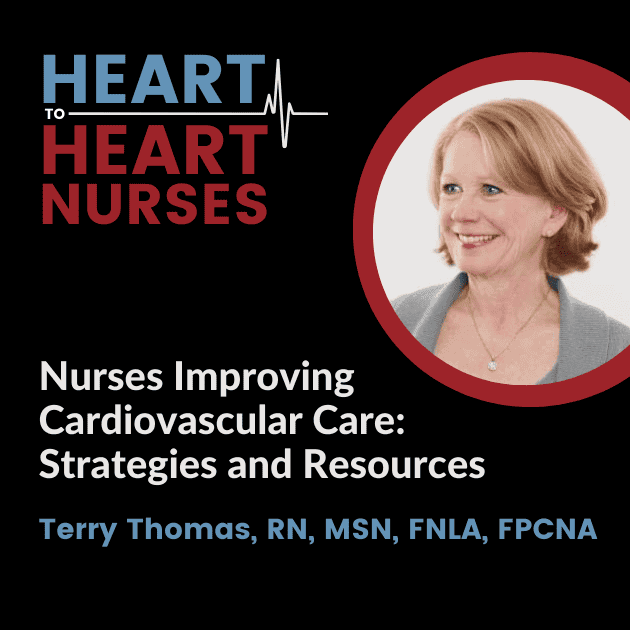Terry Thomas, RN, MSN, FNLA, FPCNA, describes how nurses improve cardiovascular care with their implementation efforts. Whether new to your career, or more tenured in CVD prevention and management, you’ll be inspired by Terry to continue to make a difference each day.
Episode Resources
- PCNA Resources
Welcome to Heart to Heart Nurses, brought to you by the Preventive Cardiovascular Nurses Association. PCNA’s mission is to promote nurses as leaders in cardiovascular disease prevention and management.
Geralyn Warfield (host): I’d like to welcome our podcast audience today to an excellent opportunity to meet someone who has had an extraordinary amount of experience in terms of cardiovascular nursing care, and also with PCNA. Terry Thomas, could you please introduce yourself to our audience?
Terry Thomas (guest): Hi, this is Terry Thomas. I’m clinical nurse specialist and I’ve been in prevention and, really, founding member of PCNA.
And the journey has been an amazing one because in the early days, some of the folks that we went to said, “But you’re a nurse”.
And we said, “But nurses get the work done. Nurses, you know, implement things”. And so, it’s been a great journey. I have valued the interacting with my colleagues over the years. Many sharing ideas over these last 30 years as the PCNA got started—hard to believe it’s that long. [00:01:00]
I’ve shared ideas, I’ve learned a lot from PCNA members. I encourage you all to do the same.
My clinical career has spanned from running individual prevention clinics to, you know, expanding to a more population-based heart disease prevention program for the state of North Carolina. Doing outreach screening, assessing, bringing high-risk women in, to then going on to population health initiatives, in cardiovascular risk reduction with employer groups, and advanced, cardiovascular labs, and genetic tests, and inflammatory markers.
And now, at this point, it’s rewarding to be involved on a larger scale in heart disease risk reduction, and stroke prevention in large populations, such as health systems and in private practices.
And I can only stress that this [00:02:00] organization is one of the strongest. It is the go-to organization. And as prevention nurses look for opportunities to share and collaborate, look for…join the chapters. Join, get involved. Recruit other colleagues. You know, it is, you have so many tools at your disposal that other organizations just don’t have.
And I know, and feel strongly, PCNA is the go-to prevention organization. So, I encourage you to reach out, to interact, to collaborate, to share ideas. That’s the best way we learn. That’s the best way we learn.
Geralyn Warfield (host): I am so excited to have the opportunity to spend time with somebody who’s seen such changes in the industry. And in the respect that nurses continue to really need and really deserve.
And I know that it’s not always [00:03:00] easy to share your opinion or share your thoughts, but what kind of strategies would you suggest to somebody who’s a little bit newer to being a cardiovascular nurse in terms of making sure they feel heard?
Terry Thomas (guest): Well, that’s a good question. I mean, let me make one comment here before I…you know, healthcare falls down on implementation. And so, I think when we think about it, I know who gets the work done and it’s the nurses.
And I can just give you a quick anecdotal, I taught lipid clinic training programs at the University of North Carolina, and when the nurses came alone, the programs got started. When the nurse came with the physician, the programs got started. When the physicians came alone, programs didn’t get started. So, I know nurses can implement, I know nurses can get the job done.
So, my advice would be, take your idea. Align yourself with like-thinking colleagues and go for it. Dream big. Dream big in [00:04:00] prevention. Have a big vision. So, for colleagues that are what the question was a little bit afraid, I’d say reach out to others in our organization and say, “Help me to understand what’s worked in that situation. Where might I go?”
Use your resources, use your colleagues. Join the chapters because I believe why reinvent the wheel? I mean, we don’t need to be in our little silo. We need to be spreading the word. We’ve got a lot of work to do.
Geralyn Warfield (host): That is a very accurate statement. There is an ongoing workload that continues to increase as more and more people age, as more and more people are being diagnosed with cardiovascular disease at early and earlier ages. So, there’s no end in sight. That’s our goal is for us to work ourselves, if you will, out of a job because we don’t, we’re trying to eradicate cardiovascular disease, but it’s not going to happen overnight. So, it’s definitely a team effort.
So, you’ve talked about reaching out to colleagues, reaching out to others in your organization, and [00:05:00] looking for resources. Are there any other resources that you would specifically point to that you have found useful?
I know for example, some people who are in, clinical application of cardiovascular disease prevention and management, they look to the guidelines. And those are ever-changing.
And making sure that you know what those latest guidelines are is very important, for example. But sometimes they’re tough to wade through. They’re very, as they should be, they’re very comprehensive. But you know, that’s an example of sometimes an organization will put together some bullet points to get you started on
Terry Thomas (guest): Mm-Hmm
Geralyn Warfield (host): What the latest and greatest are for researchers. There might be other kinds of references or resources that you would go to. What are some things that have been really helpful for you?
Terry Thomas (guest): The resources that I’ve gone to are what are best practices? You know, I just, I feel like, you know, the guidelines can be [00:06:00] tough. I mean I’ve worked in advanced lipid world, so I’ve been in another, you know, realm that’s a little different than that.
But I would just say that the resources are going to be within this organization. You know, if you have patients with heart failure, we’ve got tools. If you have patients with lipid disorders, we’ve got tools.
So, I think take advantage of every clinical resource that PCNA has to offer. And then talk amongst your buddies. There should be no secrets in this prevention world. We need to collaborate.
Geralyn Warfield (host): Excellent. We are going to take a quick break and we will be right back.
Geralyn Warfield (host): We are back talking with Terry Thomas, one of the founding members of PCNA. And we’re going to take a little bit larger view in our next part of our conversation and talk about affecting populations. Terry, could you tell us a little bit more about what that might take?
Terry Thomas (guest): Well, I think, you know, as I said earlier, I’ve always, you know, I’ve worked one-on-one with patients, then to bigger clinical programs, to [00:07:00] employer health programs, and now working in the realm of heart disease and stroke prevention in health systems in larger things.
So, I think that, you know, with all the work we have to do, it’s important to look for opportunities in your area. You know, “How can I improve healthcare within my clinical practice? How can I improve cardiovascular risk reduction in my clinical practice? How can I improve it in our health system?”
Don’t be afraid to ask the tough questions to your colleagues. And I guess I’ve been blessed because I’ve aligned myself with like-minded thinking people, and to me that’s the way to go. And so, if you can find those people who let you run with clinical ideas and build the programs, to me it’s the biggest win- win-win.
And so, I think, you know, again, ask your colleagues in PCNA, “You’ve built this kind of [00:08:00] program, tell me how you did it. Help me learn. Help me understand how you got from here to there.” Because we have a wealth of knowledge to share. All of us. I mean, I’ve been on this journey with PCNA since the inception, and it’s just been incredible to watch the growth.
So, I would encourage you to get involved. Recruit your buddies. Take advantage of every clinical tool that we have. Reach out to PCNA. They’re always there to help. I’ve reached out to them many a time. And so, it is a fabulous organization.
Geralyn Warfield (host): Well, thank you so very much, Terry Thomas, for being with us today. I hope our audience is as inspired as I am after our conversation. This is Geralyn Warfield, your host, and I will see you next time.
Thank you for listening to Heart to Heart Nurses. We invite you to visit pcna.net for clinical resources, continuing education, and much more.
Topics
- Professional Development
Published on
September 3, 2024
Listen on:

RN, MSN, FNLA, FPCNA
Related Resources
Sorry, we couldn't find any resources.






